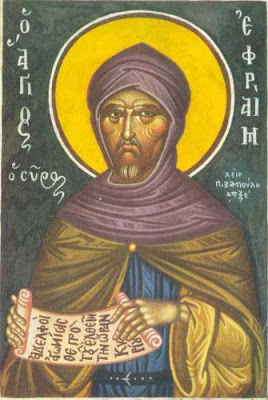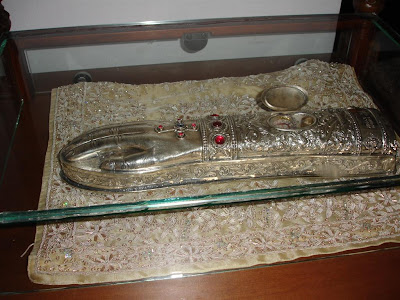 St. Ephraim the Syrian (Feast Day - January 28)
St. Ephraim the Syrian (Feast Day - January 28)Saint Ephraim the Syrian, the great poet saint of the Syriac Church, was born in c. A.D. 306 in Nisibis of Mesopotamia (northwest of Mosul, Iraq). While some late sources claim that his father was a heathen priest who worshiped an idol called Abnil, his own writings affirm that he was raised in a Christian family. He writes: "I was born in the way of truth: though my boyhood understood not the greatness of the benefit, I knew it when trial came" (Adv. Haereses, XXVI). Again more explicitly, if we may trust a Confession which is extant only in Greek: "I had been early taught about Christ by my parents; they who begat me after the flesh had trained me in the fear of the Lord... My parents were confessors before the judge: yea, I am the kindred of martyrs."
He was ordained deacon in c. A.D. 338, some say by Saint Basil the Great whom Sozomen said "was a great admirer of Ephraim and was astonished at his erudition," and served the Bishop of Nisibis, Mor Ya`qub (St. James), who participated in the Synod of Nicaea (AD 325) as one of the 318 Holy Fathers. He lived as a solitary and apparently never entered into priesthood. After the cession of Nisibis to Persia in AD 363, Ephraim withdrew into the Roman Empire and settled at Edessa where he composed the hymns that survive to this day. Though in the ecclesiastical hirearchy he was just a deacon, he is remembered as a great doctor of the universal Church.
Ephraim wrote exclusively in Syriac, the Edessene dialect of Aramaic, but his works were translated into Armenian and Greek, and via the latter into Latin and Slavonic. Many works in these languages attributed to him are, however, not genuine. Of the multitude of sermons, commentaries, and hymns that Saint Ephraim wrote, many were translated into Greek in his own lifetime. Sozomen says that Ephraim "Surpassed the most approved writers of Greece," observing that the Greek writings, when translated into other tongues, lose most of their original beauty, but Ephraim's works "are no less admired when read in Greek than when read in Syriac" (Eccl. Hist., Book 111, 16). Much of Ephraim's exegetical, dogmatic and ascetic works are in verse form. He wrote several polemical works refuting the heresies of Marcion, Bardaisan, Mani, the Arians and the Anomoeans. He wrote widely regarded biblical commentaries on Genesis and the Diatesseron. His writings extensively employ typology and symbolism. Over 500 genuine hymns survive, of great beauty and insight. His poetry is in two genres: madrãshe (hymns) and memre (verse homilies). After his death, the hymns were arranged into hymn cycles, the most famous of which are those On Faith (including the five 'On the Pearl'), On Paradise and On Nisibis (the second half of which is on the 'Descent of Christ into Hell'). His liturgical poetry had a great influence on Syriac and Greek hymnography. Saint Ephraim was the first to make the poetic expression of hymnody and song a vehicle of Orthodox theological teachings, constituting it an integral part of the Church's worship; he may rightly be called the first and greatest hymnographer of the Church, who set the pattern for those who followed him, especially Saint Romanos the Melodist. Orthodox churches honor him as 'the Harp of the Holy Spirit'. Jerome says that his writings were read in some churches after the reading of the Scriptures, and adds that once he read a Greek translation of one of Ephraim's works, "and recognized, even in translation, the incisive power of his lofty genius" (De vir. ill., ch. CXV).
Shortly before the end of his life, a famine broke out in Edessa, and Saint Ephraim left his cell to rebuke the rich for not sharing their goods with the poor. The rich answered that they knew no one to whom they could entrust their goods. Ephraim asked them, "What do you think of me?" When they confessed their reverence for him, he offered to distribute their alms, to which they agreed. He himself cared with his own hands for many of the sick from the famine, and so crowned his life with mercy and love for neighbor.
St. Ephraim departed to his heavenly abode on 9th of June, A.D. 373, according to others, 379.

Apolytikion in the Fourth Tone
With the rivers of your tears, you have made the barren desert fertile. Through sighs of sorrow from deep within you, your labors have borne fruit a hundred-fold. By your miracles you have become a light, shining upon the world. O Ephraim, our Holy Father, pray to Christ our God, to save our souls.
Kontakion in the Second Tone
At all times didst thou foresee the hour of reckoning, and pricked in thy heart, thou ever didst lament with tears; and, O righteous Ephraim, thou wast a mighty teacher in works and deeds. Hence, O Father for all the world, thou didst rouse the slothful unto change of heart.

He was ordained deacon in c. A.D. 338, some say by Saint Basil the Great whom Sozomen said "was a great admirer of Ephraim and was astonished at his erudition," and served the Bishop of Nisibis, Mor Ya`qub (St. James), who participated in the Synod of Nicaea (AD 325) as one of the 318 Holy Fathers. He lived as a solitary and apparently never entered into priesthood. After the cession of Nisibis to Persia in AD 363, Ephraim withdrew into the Roman Empire and settled at Edessa where he composed the hymns that survive to this day. Though in the ecclesiastical hirearchy he was just a deacon, he is remembered as a great doctor of the universal Church.
Ephraim wrote exclusively in Syriac, the Edessene dialect of Aramaic, but his works were translated into Armenian and Greek, and via the latter into Latin and Slavonic. Many works in these languages attributed to him are, however, not genuine. Of the multitude of sermons, commentaries, and hymns that Saint Ephraim wrote, many were translated into Greek in his own lifetime. Sozomen says that Ephraim "Surpassed the most approved writers of Greece," observing that the Greek writings, when translated into other tongues, lose most of their original beauty, but Ephraim's works "are no less admired when read in Greek than when read in Syriac" (Eccl. Hist., Book 111, 16). Much of Ephraim's exegetical, dogmatic and ascetic works are in verse form. He wrote several polemical works refuting the heresies of Marcion, Bardaisan, Mani, the Arians and the Anomoeans. He wrote widely regarded biblical commentaries on Genesis and the Diatesseron. His writings extensively employ typology and symbolism. Over 500 genuine hymns survive, of great beauty and insight. His poetry is in two genres: madrãshe (hymns) and memre (verse homilies). After his death, the hymns were arranged into hymn cycles, the most famous of which are those On Faith (including the five 'On the Pearl'), On Paradise and On Nisibis (the second half of which is on the 'Descent of Christ into Hell'). His liturgical poetry had a great influence on Syriac and Greek hymnography. Saint Ephraim was the first to make the poetic expression of hymnody and song a vehicle of Orthodox theological teachings, constituting it an integral part of the Church's worship; he may rightly be called the first and greatest hymnographer of the Church, who set the pattern for those who followed him, especially Saint Romanos the Melodist. Orthodox churches honor him as 'the Harp of the Holy Spirit'. Jerome says that his writings were read in some churches after the reading of the Scriptures, and adds that once he read a Greek translation of one of Ephraim's works, "and recognized, even in translation, the incisive power of his lofty genius" (De vir. ill., ch. CXV).
Shortly before the end of his life, a famine broke out in Edessa, and Saint Ephraim left his cell to rebuke the rich for not sharing their goods with the poor. The rich answered that they knew no one to whom they could entrust their goods. Ephraim asked them, "What do you think of me?" When they confessed their reverence for him, he offered to distribute their alms, to which they agreed. He himself cared with his own hands for many of the sick from the famine, and so crowned his life with mercy and love for neighbor.
St. Ephraim departed to his heavenly abode on 9th of June, A.D. 373, according to others, 379.

Apolytikion in the Fourth Tone
With the rivers of your tears, you have made the barren desert fertile. Through sighs of sorrow from deep within you, your labors have borne fruit a hundred-fold. By your miracles you have become a light, shining upon the world. O Ephraim, our Holy Father, pray to Christ our God, to save our souls.
Kontakion in the Second Tone
At all times didst thou foresee the hour of reckoning, and pricked in thy heart, thou ever didst lament with tears; and, O righteous Ephraim, thou wast a mighty teacher in works and deeds. Hence, O Father for all the world, thou didst rouse the slothful unto change of heart.
